Why you can trust Tom's Hardware
Intel's decision to adopt a hybrid x86 architecture was risky, but despite the early hiccups with Windows 10, the performance that we've seen today shows it has paid off. The Alder Lake processors mark a massive generational leap forward for Intel in nearly all facets, including gaming, performance in lightly- and heavily-threaded work, power consumption, overclocking, and platform connectivity options.
Intel has coupled Alder Lake's expansive list of advantages with very aggressive pricing that gives them the overall lead against AMD's competing Ryzen 5000 chips. The competitive pricing could also take at least a little of the sting out of the inevitable high platform costs associated with the Z690 motherboards that are currently the only option for Alder Lake systems.
Below, we have the geometric mean of our gaming test suite at 1080p and 1440p and a cumulative measure of performance in single- and multi-threaded applications. Bear in mind that we conducted the gaming tests with an RTX 3090, so performance deltas will shrink with lesser cards and higher resolution and fidelity settings.
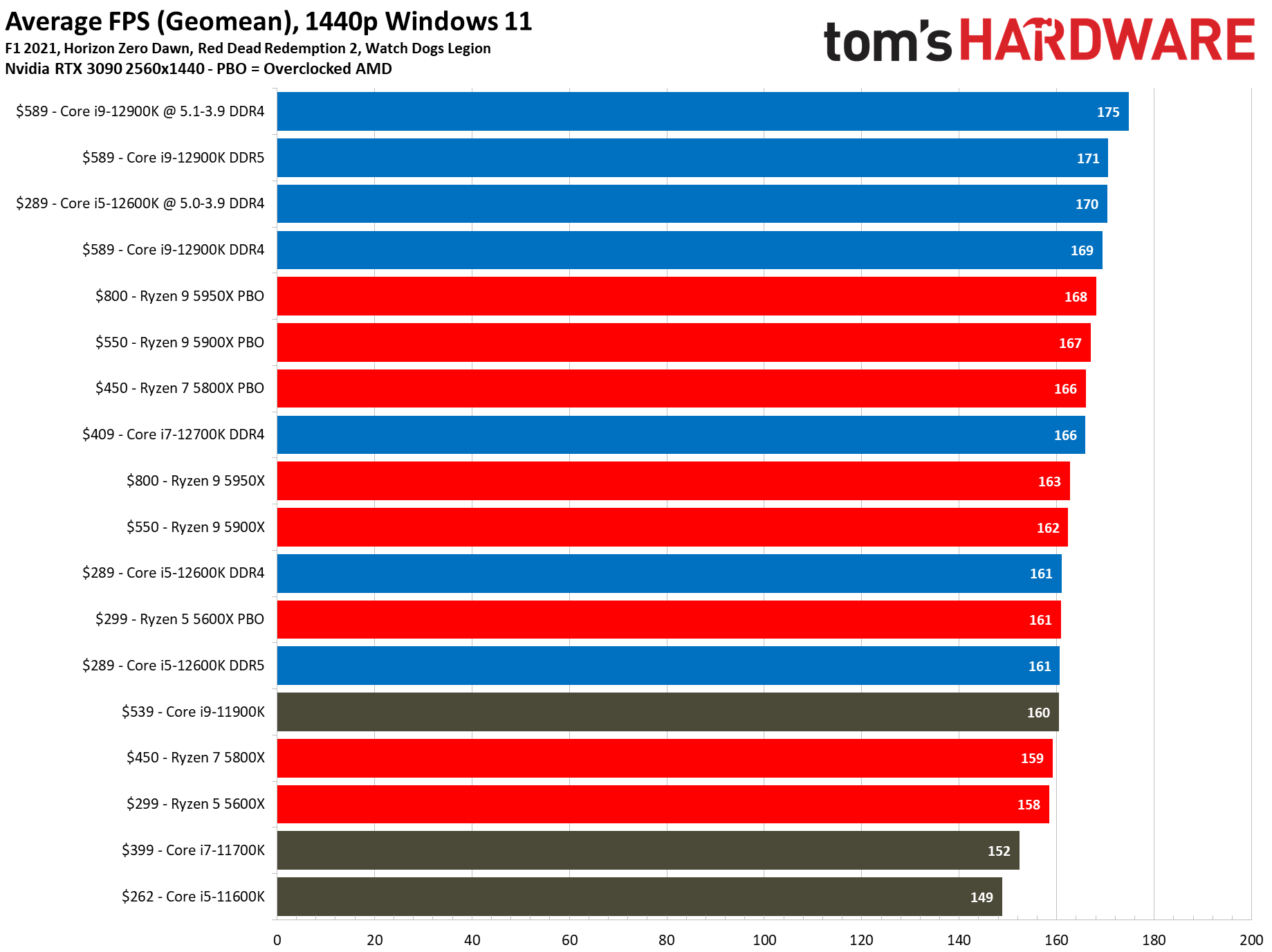
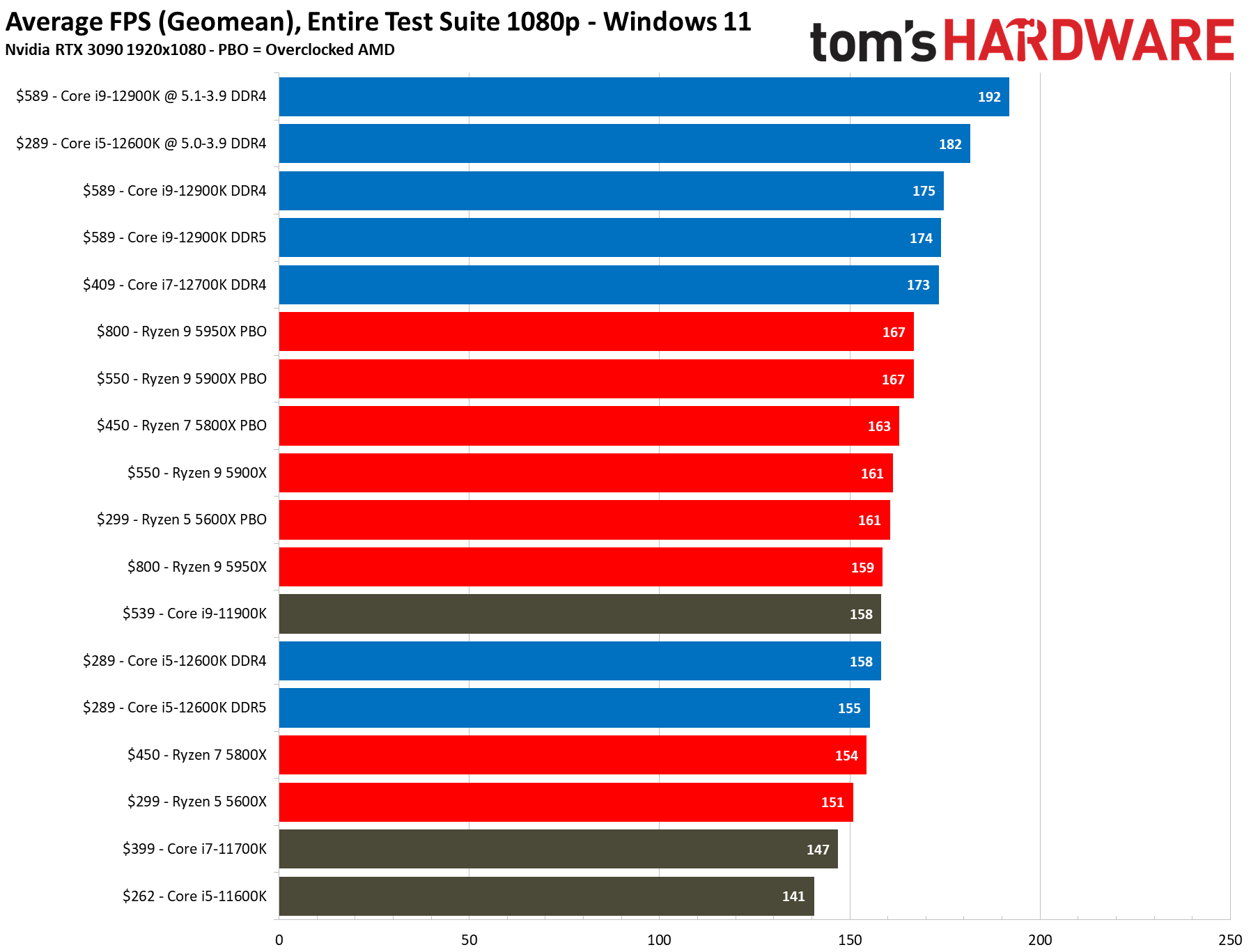
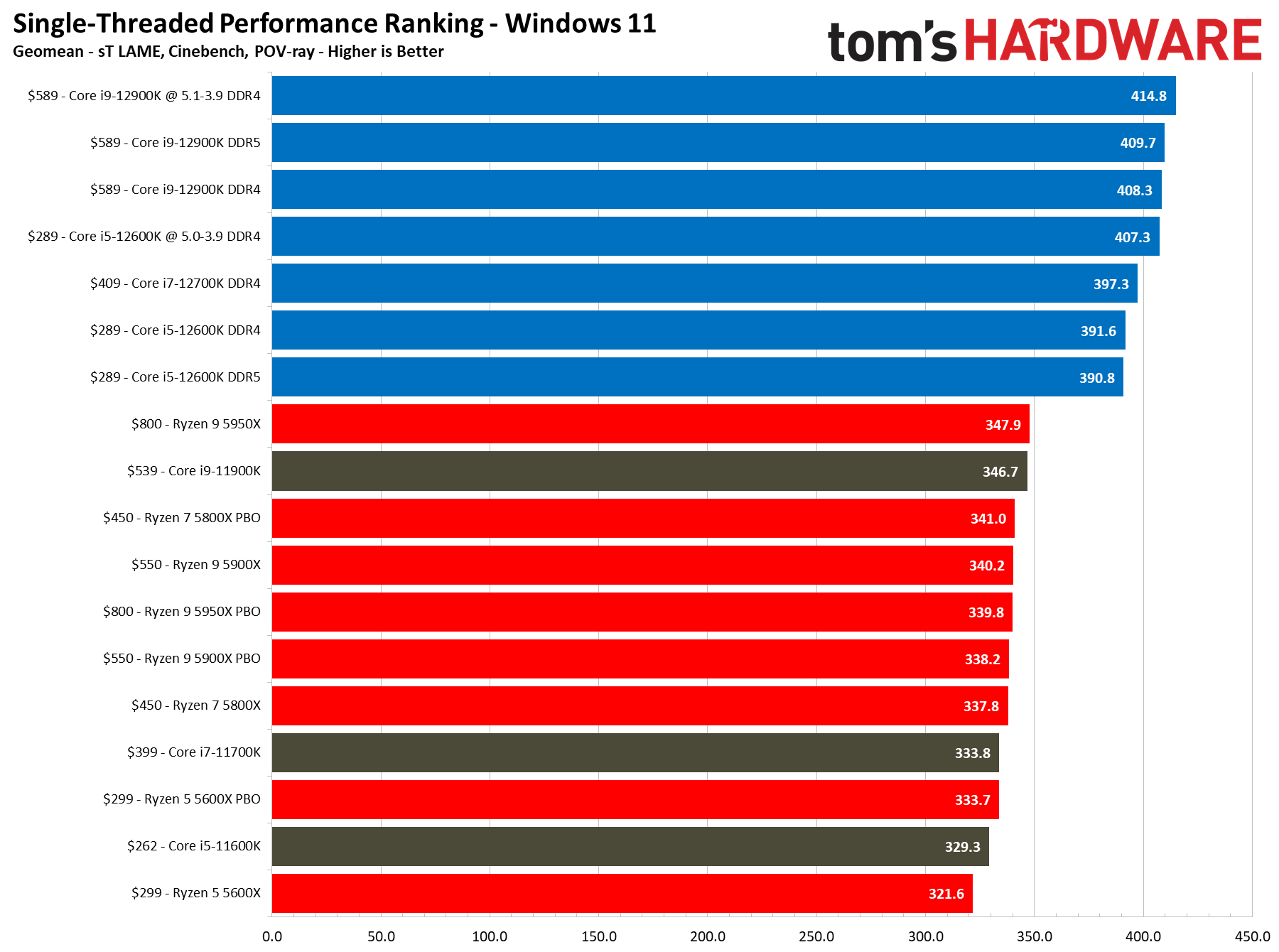
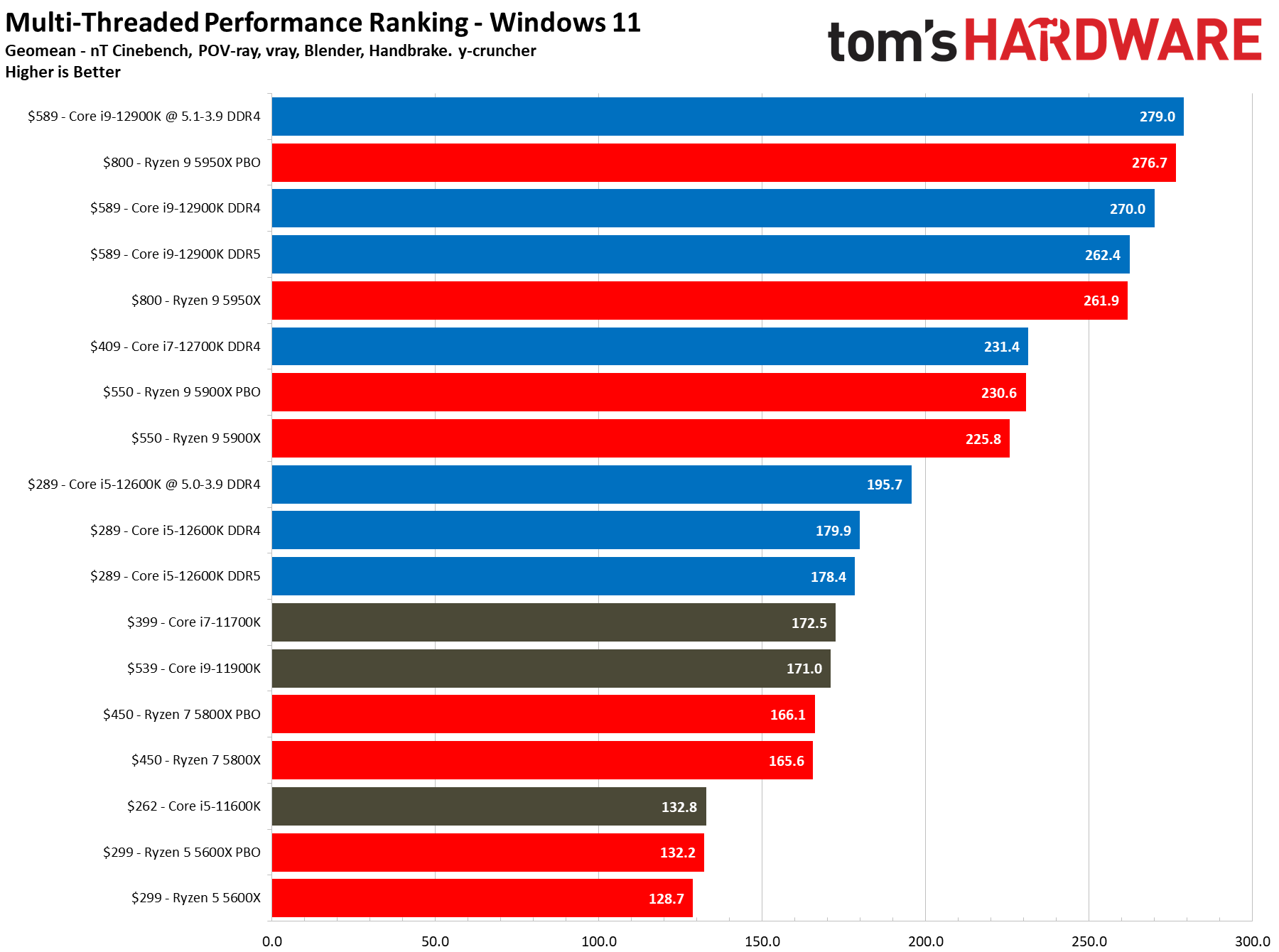
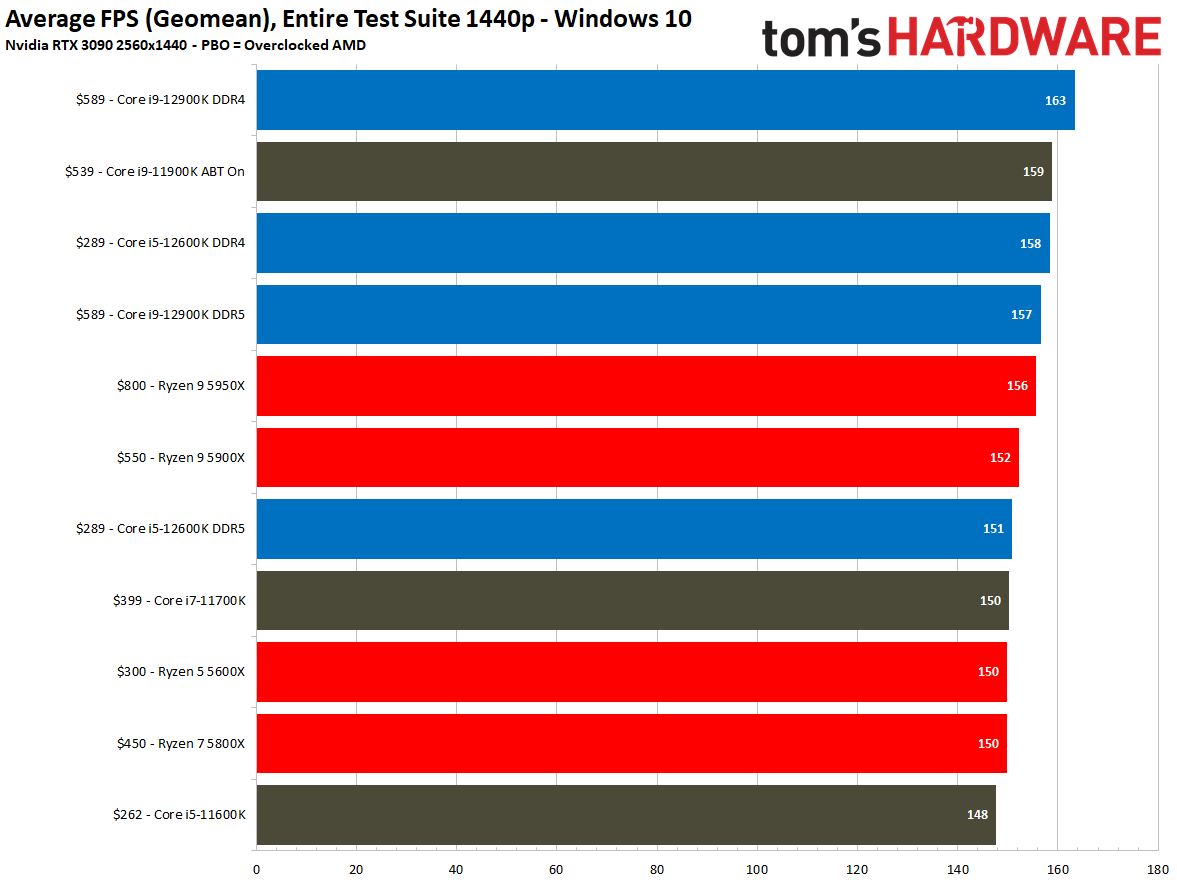
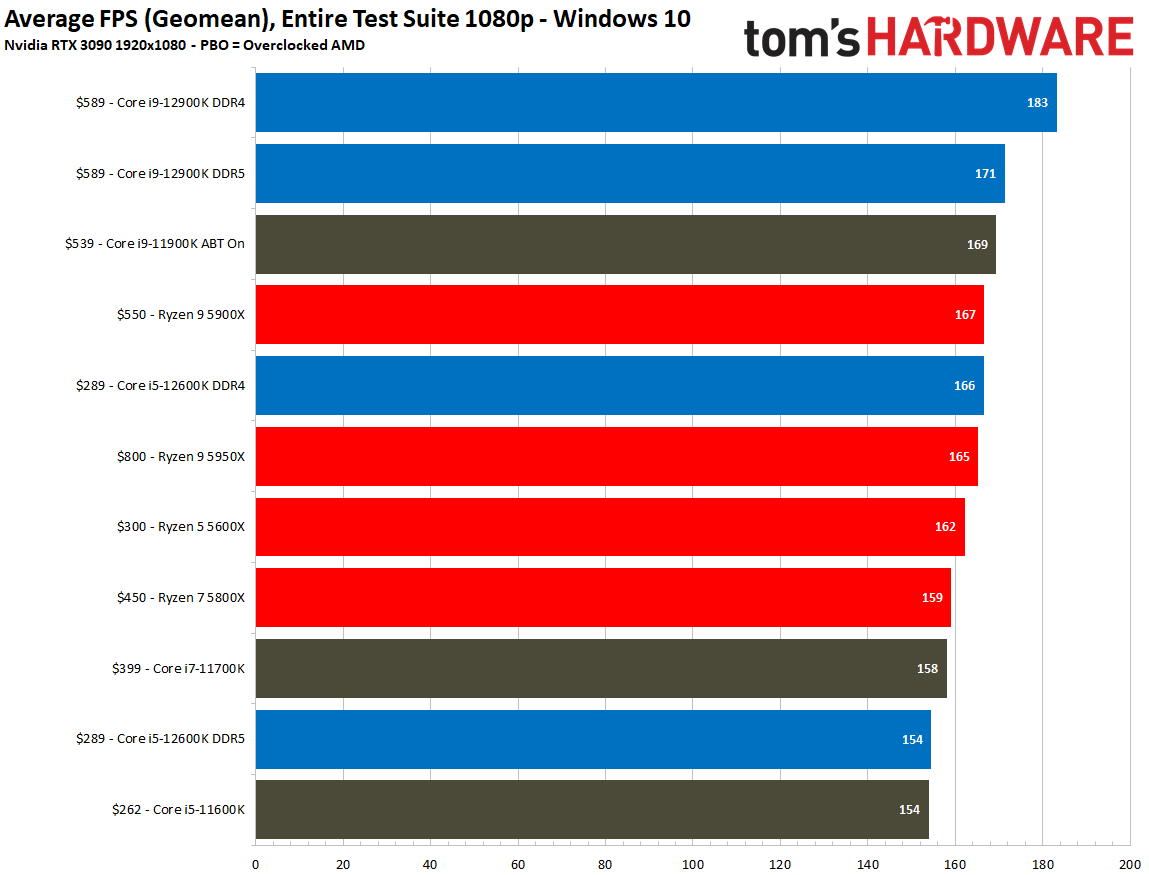
Overall, it's easy to recommend an Alder Lake chip for a Windows 11 system, but much like we encountered in our own testing, there could be initial hiccups with Windows 10 systems. As we outlined above, those problems could include performance variability or programs that don't operate to their full potential. If you're averse to working around those types of problems, it might be best to either use Windows 11 or wait for the software ecosystem to adapt to the hybrid architecture. We do expect these problems to be fixed sooner rather than later, though.
Surprisingly, Intel hasn't worked up a piece of software to provide more granular control over scheduling priority for both Windows 10 and 11, but third-party tools can assist with priority management (Process Lasso comes to mind). We'll certainly be experimenting over the coming weeks.
Alder Lake's advantages also include platform connectivity. Leading-edge DDR5 and PCIe 5.0 interfaces will add some cost in the early days, but support for DDR4 can help reduce that overhead. Unfortunately, we haven't seen any flagship DDR4 motherboards yet; the highest-end models appear to be confined to DDR5.
Alder Lake delivers impressive gaming performance in both Windows 10 and 11, though the gains are more substantial in the latter. In either case, the chips outpaced AMD's competing models throughout both of our gaming test suites. It's also clear that enthusiasts won't need to adopt pricey DDR5 memory to unlock the best gaming performance — unless you have a very specific need for DDR5 throughput, it's probably best to skip it until it matures further. That applies doubly so for Windows 10, which appears to favor the more mature DDR4.
Don't believe the hype — overclocking is certainly not dead. After tuning, the Core i9-12900K with DDR4 was 9.7% faster than the stock configuration at 1080p gaming. Meanwhile, the Core i5-12600K was 15% faster, which is more of a gain than we would expect from stepping up to a new chip generation. In fact, it's been a long time since we've seen double-digit overclocking performance gains in gaming from easily-attainable frequencies. Overall, the Alder Lake chips are a boon for enthusiasts. By comparison, the overclocked Ryzen chips were anywhere from 3.7% to 6.6% faster after tuning, so it's clear Intel holds the lead here.
Get Tom's Hardware's best news and in-depth reviews, straight to your inbox.
Intel still consumes more power than AMD's competing chips, but the new 'Intel 7' process reduces power consumption by up to a third and nearly doubles power efficiency, reducing AMD's massive advantage in that key area.
For now, Alder Lake is the new gaming champion. AMD's next step is to fire back with its 3D V-Cache processors that will come with up to 192MB of L3 cache per chip, imparting up to 15% more gaming performance. Those chips arrive next year, and while the impact on gaming in a broad spate of titles is unknown, AMD has confirmed that the chips will drop into the AM4 platform. In the meantime, we could see some pricing adjustments on Ryzen 5000 series processors.
The Core i9-12900K delivers incredible levels of threaded performance, often rivaling or beating the Ryzen 9 5950X, but at a much lower price point. That type of performance will pay off in all manner of productivity applications, and if you're looking for snappy performance in lighter fare, it's also the uncontested leader in x86 single-threaded performance.
Alder Lake marks the return of meaningful segmentation between the Core i7 and i9 lineups. With an additional four efficiency cores and class-leading gaming performance, the Core i9-12900K is a good choice for a Windows 11 system, but if you're only interested in gaming, the Core i7-12700K is a far better deal — it provides roughly the same gaming performance as the Core i9-12900K, but at a much lower price point. That makes the Core i9-12900K more suited for those with more expansive needs, such as more heft in multi-threaded productivity workloads.
The $289 Core i5-12600K is also an easy recommendation with up to 38% more threaded performance than the Ryzen 5 5600X and 7% more performance than the Ryzen 7 5800X. Coupled with its pricing, snappy single-threaded performance, and superb gaming performance, the Core i5-12600K is the gaming chip to beat.
- MORE: Best CPUs for Gaming
- MORE: CPU Benchmark Hierarchy
- MORE: AMD vs Intel
- MORE: All CPUs Content
Current page: Putting 14nm in the Rearview
Prev Page Core i9-12900K and i5-12600K Windows 10 Application Benchmarks
Paul Alcorn is the Editor-in-Chief for Tom's Hardware US. He also writes news and reviews on CPUs, storage, and enterprise hardware.
-
Alvar "Miles" Udell I'm not so sure it will be a short crown retaking. AMD hasn't shown any indication yet they are officially reducing prices to compete, and with Zen 3+ likely to be more expensive than Zen 3, it may be quite the role reversal with Intel the best value. When Zen 4 becomes widely available in 2023 who knows, but as it stands I'd have a tough time recommending AMD over Intel at this point.Reply -
VforV LMAO, 29 days ago this same guy had this article:Reply
Intel Core i9-12900K vs Ryzen 9 5900X and 5950X: Alder Lake and Ryzen 5000 Face Off
Now he has a "review" of them. Pffft.
Why don't you do another "review" again in 1 month, since intel does not have enough promo pieces already...
P.S. Even with the exaggerated positive press Alder Lake had and has, still is not selling great... Still I see their CPUs in stock at better prices than Ryzen and not moving that stock. I find it hilarious. -
m3city I just don't get it. Maybe I just can't find the right numbers. Maybe I'm cherry picking but when I see:Reply
5900 vs 12900, CPU price somewhat similar.
Cruncher multi 100W@37sec, 170W@107s. Single thread shows better Intel.
Handbrake x264 4 renders vs 3 renders, 130W vs 213W, 151s vs 262s.
Noted, Intel has iGPU - thats BIG, at least for me.
Better CPU overall? As I said, I just don't see it. Intel is bigger, stronger. Not a better athlete at all. -
helper800 I do not know what the others are on about. The new Alder lake CPU's are objectively better at more things than AMDs offerings are vs Alder lake. @VforV Anyone could argue the same about positive press for the zen 1 and 2 products. Personally I am just happy some semblance of competition is back. If you are looking at this with anything other than it being a win for consumers, than you've got brand loyalties that may make you buy into objectively worse hardware. Intel also comes in cheaper at most all price points (with exception to some whole platform considerations).Reply -
VforV Reply
I'm glad for competition, but no Alder Lake is not an outstanding success beating Zen3 from A to Z and at everything and anything. Far from that...helper800 said:I do not know what the others are on about. The new Alder lake CPU's are objectively better at more things than AMDs offerings are vs Alder lake. @VforV Anyone could argue the same about positive press for the zen 1 and 2 products. Personally I am just happy some semblance of competition is back. If you are looking at this with anything other than it being a win for consumers, than you've got brand loyalties that may make you buy into objectively worse hardware. Intel also comes in cheaper at most all price points (with exception to some whole platform considerations).
Like nvidia, intel too has to win back a lot of good will before I even care about them, after all the **** they done in the last 7 or so years.
I rather buy an inferior product than step over my principles and dignity and s*** up to those 2 companies and give them my money for a minority performance advantage (at a point in time). Nvidia is actually worse than intel, but intel is bad enough still.
Coming Zen3D, interest in Alder Lake will drop even more (it already has worse sales than predicted/wanted).
Yes, competition is good, but only because it pushes AMD to be even better than if they did not have at all. That's the only part I care about. -
helper800 Reply
I can respect your opinion, but I disagree. In my opinion companies all do what they can to stay as profitable as they can. Consumer "goodwill" is just another currency these large multinational companies spend and receive for various conduct. AMD currently has a decent amount of goodwill, however, they spent a major chunk of it by not releasing a 5600, 5300, 5700 / 5800 while also increasing prices by 50 dollars across the board. They did this for money and they knew they could get away with it because they had garnered enough consumer goodwill.VforV said:I'm glad for competition, but no Alder Lake is not an outstanding success beating Zen3 from A to Z and at everything and anything. Far from that...
Like nvidia, intel too has to win back a lot of good will before I even care about them, after all the **** they done in the last 7 or so years.
I rather buy an inferior product than step over my principles and dignity and s*** up to those 2 companies and give them my money for a minority performance advantage (at a point in time). Nvidia is actually worse than intel, but intel is bad enough still.
Coming Zen3D, interest in Alder Lake will drop even more (it already has worse sales than predicted/wanted).
Yes, competition is good, but only because it pushes AMD to be even better than if they did not have at all. That's the only part I care about. -
VforV Reply
There is no innocent company, AMD included. I also don't like those same things you stated about AMD that they did recently, but compared to nvidia and intel (on topic), the amount of scummy or s* things AMD did is almost meaningless.helper800 said:I can respect your opinion, but I disagree. In my opinion companies all do what they can to stay as profitable as then can. Consumer "goodwill" is just another currency these large multinational companies spend and receive for various conduct. AMD currently has a decent amount of goodwill, however, they spent a major chunk of it by not releasing a 5600, 5300, 5700 / 5800 while also increasing prices by 50 dollars across the board. They did this for money and they knew they could get away with it because they had garnered enough consumer goodwill.
... so far. And that is what matters to me. It's not like I'm losing so much performance if I use AMD, like it was the case 5-7 years ago, they are either on top or very close to the top, depending on the generation. -
DSzymborski If you want a site that writes articles that only conform to your personal philosophical ideals, you'll need to start up VsHardware.com. It's not the job of a reviewer to review CPUs based on who "deserves" anything, but what the performances are.Reply -
VforV Reply
Sure, I'd love to see that professional impartiality from all the tech sites and YT channels, but the reality is so much different than these utopian journalism rules... which almost no one cares about or abides by them anymore. The trend is actually in the opposite direction.DSzymborski said:If you want a site that writes articles that only conform to your personal philosophical ideals, you'll need to start up VsHardware.com. It's not the job of a reviewer to review CPUs based on who "deserves" anything, but what the performances are.
So in that regard, in a perfect world you would be right.
Then I am also right when I say, everyone that buys a product does it based on it's own preference and subjective feeling and beliefs towards that product.
Thus, we all give or money to those that we think they deserve out money. And we don't give to those that don't.
Which means I don't give my money to those companies that do NOT: in this case, intel and nvidia. At least not until they prove they are atoning for all the s* they did up until now and start to do better. But if they never change and keep doing s*, then it's a no from me. It's as simple as that and I don't see a problem with this whatsoever. I may be in a minority thinking like this, but I know I'm not the only one.